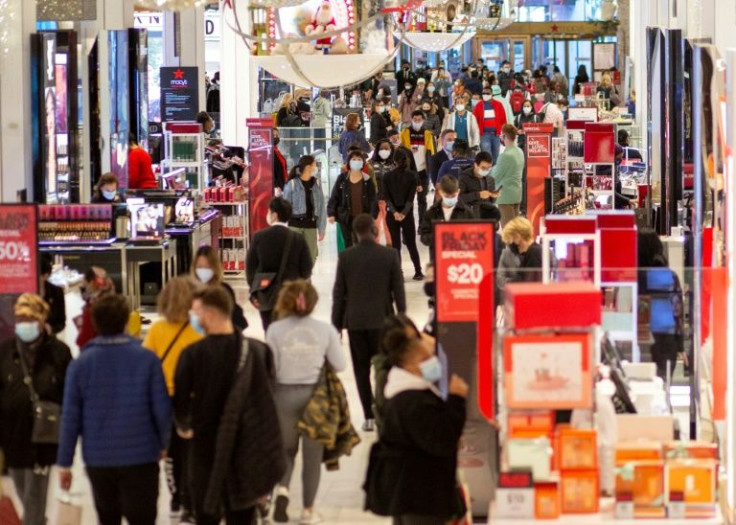Black Friday 2021: Retailers Face Unprecedented Challenges, But Consumers Are Prepared To Spend Big
Thanksgiving is a time when Americans come together as families to contemplate everything in life for which they are truly grateful. Traditional foods are prepared and eaten, games of football played, and for many people thoughts will turn toward the other big celebrations of the holiday season — Christmas, Hanukkah and Kwanzaa.
The day after Thanksgiving, though, has gained a somewhat less harmonious reputation. Widely-reported instances of chaos and disorder in malls and superstores aside, Black Friday is also an all-important period for the retail industry where profit margins can be boosted and losses from the previous months recouped.
The pandemic has been a tough time for many, especially brick-and-mortar stores, so it's vital that Black Friday 2021 is a success for retailers. Unfortunately, well-publicized issues affecting the supply chain threaten to scupper this year's event with container ships queuing in their dozens outside of U.S. ports, waiting to be unloaded so goods can be distributed across the country.
Retailers put a great deal of planning into Black Friday promotions and shoppers who want to get the best bargains also need to be prepared. This has never been more true than in 2021, with 42% of respondents to Attest's new Black Friday 2021 research saying that they have started their Christmas shopping early in response to supply chain disruptions. It seems that after a tough year, many Americans want to ensure that this festive season is as merry as possible.

Black Friday fatigue sets in
As well as distribution issues, retailers also face another big problem this year. The name "Black Friday" might imply that it is a single-day event, but the reality is that the promotional period can be several weeks long now. And it seems that there is a growing fatigue amongst consumers for month-long Black Friday bonanzas, with 43% wanting just one to three days worth of sales, and 26% wanting it to return to its roots as a one-day event. Apparently our attitude this year is less "ho ho ho" and more "bah humbug."
Despite this, however, most Americans — 58% — still agree that Black Friday is the best day of the year for snapping up a bargain. Just under half of Americans say they will buy something on the day, while a third are undecided about taking part. Meanwhile, 21% have decided they will not buy any products on the day.
Retailers reliant on physical stores that have been suffering from lockdowns and greatly reduced footfall should also take solace in the fact that 65% of respondents said they were “comfortable” with in-person shopping, despite the ongoing pandemic. Nearly six in 10 of those surveyed said they planned to buy both in-person and online, while 25% said they would buy exclusively online.
In terms of the retailers that would be at the front of consumers' minds, Walmart was the top choice among respondents, followed by Amazon, Target and Macy’s.
COVID-19: Caution still required
While a significant number of people will visit stores for Black Friday promotions, there are many others who feel there is still a certain amount of caution required. More than four in 10 wanted stores to require shoppers to wear masks, while nearly one-third said the number of people in the store at any one time should be limited. A quarter said that retailers should be free to set their own rules, while 8% said that retailers shouldn't be following any pandemic protocols.
There is a sizable number of people who don't yet feel at ease shopping in person, with 17% feeling uncomfortable visiting stores. Crowded shops and unvaccinated people were cited as the two biggest reasons for this apprehension. This reluctance is most keenly felt among Generation X, while Millennials and Generation Z are much more likely to be comfortable making the trip to brick-and-mortar outlets.
Online or in-person, Americans are ready to spend
There was a wide divergence amongst respondents on how much they were planning to spend. Nearly a quarter (22%) said that they would spend between $300 and $500, with 21% planning on limiting their spending to between $100 and $200. However, more than one in 10 said they would splurge over $750 to $1,000 on the day.
When it comes to what people plan to buy, the most popular category was technology, with 69% hoping to bag a tech bargain. Close behind was clothing at 68%, followed by home goods (51%), beauty products (39%) and kitchen appliances (30%).
While retailers might be feeling gloomy about Black Friday 2021, there are reasons for optimism. But with 55% of Americans saying that even with all the news coverage of supply chain disruptions they do not plan to alter their approach to Christmas shopping, there could be a lot of disappointment for consumers. It's clear that shoppers who want the best chance of getting a good deal — and get their items before the festive period begins — need to act fast. Let's hope that Santa Claus takes note.
Jeremy King is the founder and CEO of Attest.
© Copyright IBTimes 2025. All rights reserved.





















